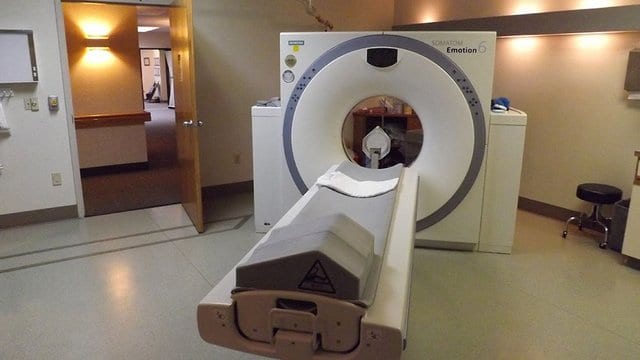CT - Spiral (Multi-Slice CT Scan)
Serving Latham NY
Computerized Tomography (CT or CAT) scans use a thin X-ray beam to get images of your organs, bones, blood vessels, and soft tissues. The origin of the word "tomography" is from the Greek word "tomos" meaning "slice" or "section" and "graphe" meaning "drawing. It produces cross-sectional images or "slices" of anatomy which are used for a variety of diagnostic and therapeutic purposes. A Spiral CT scans the body in a spiral path which allows more images to be made in a shorter time than with older CT methods and it delivers a lower dose of radiation than traditional CT scans.
Capital Imaging Associates is a full-service diagnostic medical imaging provider with state-of-the-art equipment. We offer a range of women's health care services in Latham, Clifton Park, NY, and beyond. If you have any questions, please get in touch with us today.
Did You Know?
• Our Somatom Emotion Spiral CT unit provides advanced multi-slice spiral technology for fast, accurate CT examinations.
• The scan is 8 to 10 times faster than a traditional CT scanner, saving time and reducing radiation exposure.
• A Spiral CT produces a clearer, more defined image than traditional X-ray imaging while also eliminating the need for multiple scans.
• Spiral CT has the ability to differentiate between bone tissue, fluid, and other soft tissues. It can offer better distinctions between tissue and lesions, as well as detailed views of vascular anatomy.

Exam Prep For Computed Tomography (CT)
Exam Instructions
You may take medications prior to exam with a small amount of water.
You will not have to undress for the following:
HEAD - No eating or drinking for 4 hrs prior to your scan
SINUS - No restrictions
DENTAL IMPLANT STUDIES - No restrictions
If you wear clothing with no buttons, snaps or zippers or metal, you will not have to undress for your following exam.
NECK - No eating or drinking for 4 hrs prior to your scan
ABDOMEN - No eating or drinking for 4 hrs prior to your scan
PELVIS - No eating or drinking for 4 hrs prior to your scan
SPINE - No restrictions
EXTREMITIES (arms/legs) - No restrictions
CT Questionnaires
(Please download, fill out and bring to your exam)
Abdomen (Adrenal Glands, Kidneys, Liver, Pancreas): Abdomen/Pelvis Evaluation
Brachial Plexus: Chest Evaluation
Chest: Chest Evaluation
Head (IACs, Pituitary, Cranial Nerves): Cranial Evaluation
Lower Extremity (Hip, Leg, Knee, Ankle, Foot, Toes): Lower Extremity
CT Questionnaires Continued
Neck: Neck/Spine Evaluation
Pelvis (Sacrum, SI Joints): Abdomen/Pelvis Evaluation
Spine: Neck/Spine Evaluation
Upper Extremity (Shoulder, Clavicle, Arm, Elbow, Wrist, Hand, Fingers): Upper Extremity
Frequently Asked Questions About Computed Tomography - CT
Computed Tomography, or CT, is a diagnostic procedure that combines digital X-ray techniques with computer technology. This combination makes it possible to obtain highly detailed cross-sectional images of many types of tissue, including the lungs, bones, soft tissues and blood vessels which helps diagnose your condition with greater accuracy. Our multi-slice spiral CT scanner acquires higher quality images, 75% faster than previously possible.
- Abdomen/Pelvis: Evaluation of the liver, spleen, pancreas, gallbladder, kidneys, bowel, ovaries, uterus, bladder and prostate as well as aneurysms of major vessels.
- Brain: Headaches and other brain related problems or conditions.
- Chest: Problems associated with the lungs, mediastinum, ribs and blood vessels in the chest.
- Extremities (arms & legs): Injuries, disease and congenital deformities.
- Low-Dose Lung Screenings: Early detection of disease in smokers and those with previous smoking history using an extremely low dose of radiation
- Neck: Evaluation of the neck structures and blood vessels.
- Sinuses: Sinusitis, polyps and masses.
- Spine: Disc herniations, arthritis and fractures.
CT does use radiation to acquire the images, but our Siemens Emotion scanner uses a function called “Care Dose” which automatically delivers the least amount of radiation necessary for quality images. The amount of radiation changes as we scan so that the dosage is tailored for your unique body type.
If you are pregnant or think you might be, always inform our staff prior to your exam.
Since our opening in 1985, our mission is to provide you, and your family, with the best medical imaging care available. Our CT program is accredited by the American College of Radiology (ACR) ensuring that your CT is handled by experts in the field.
You will be positioned comfortably on the examination table, which will be moved into the opening of the scanner. You may be asked to hold your breath while scans are being taken.
Some exams require you to drink a contrast material prior to your test, but you will generally be on the table less than 10 minutes.
Contrast materials, also referred to as dyes, are liquids administered to enhance the area being examined.
Abdomen and pelvic studies usually require you to drink a contrast material prior to your exam to help the radiologist differentiate your stomach and bowel from other structures.
Some CT exams require intravenous contrast, by itself or in addition to oral contrast. If intravenous contrast is necessary for your exam, it will be fully explained to you when you arrive for your exam.
- SINUS, SPINE, EXTREMITIES (arms/legs), LOW DOSE LUNG SCREENINGS, DENTAL IMPLANT STUDIES – There are no restrictions prior to your CT.
- HEAD, NECK, CHEST, ABDOMEN, PELVIS – No eating or drinking for 4 hours prior to your appointment.
You may take medications prior to any CT exam with a small amount of water.
If you wear clothing with no buttons, snaps or zippers, you will not have to undress for your exam. We will be happy to discuss any specific questions or concerns you may have about your CT. CONTACT US at 518.785.7373Our board-certified radiologists interpret your CT Scan. Our goal is to have a written report to your doctor within 24-36 hours of your exam. In most cases, the report is ready the same day.
